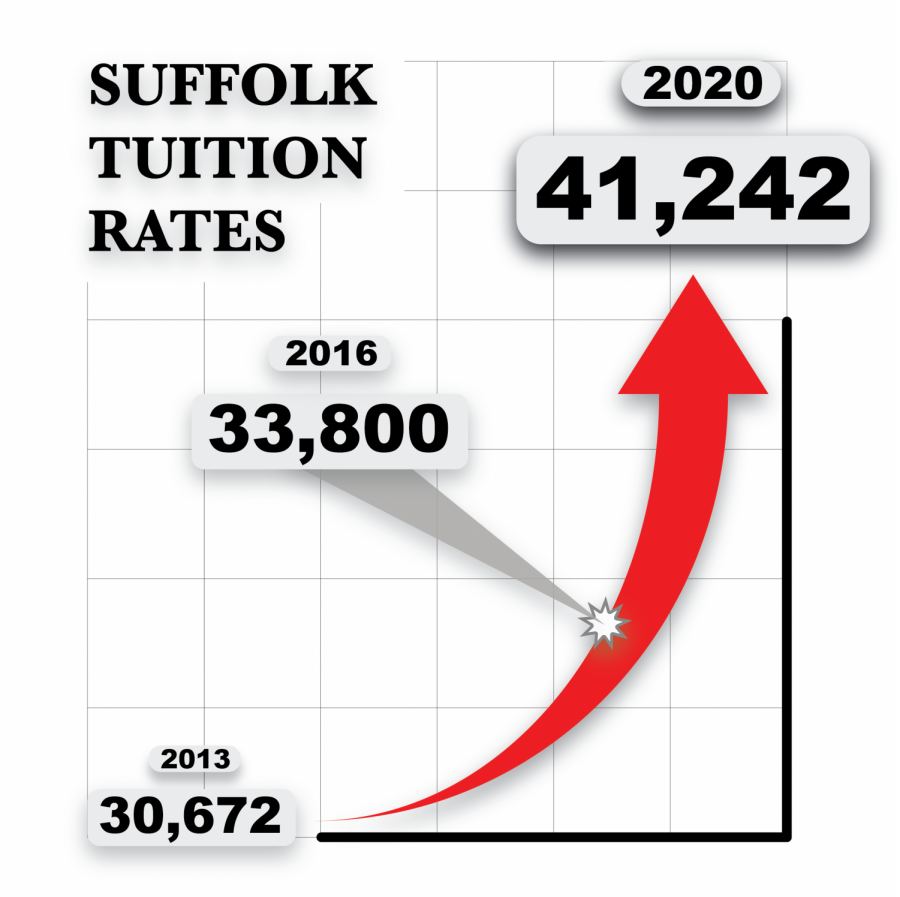Suffolk students will see another tuition increase next year, Suffolk University President Marisa Kelly said in an email to students on Jan. 15.
The tuition for the 2020-2021 academic year will increase from $40,104 to $41,242 which totals a $1,138 increase.
According to the Senior Vice President for Finance & Administration and Suffolk University’s Treasurer Laura Sander, tuition has risen by $12,716 since 2010. She explained that the price hike is due in part to the rise of operating costs that increase each year.
According to Sander, the increase was partially influenced by the Suffolk 2025 plan, which was set into motion in the fall of 2018.
“The Suffolk 2025 strategic plan calls for even greater investments that will improve students’ time here on campus, even after they’ve left and they’re alumni,” said Sander.
The plan’s goal is to improve services for students with an expanded center for career education and professional development, a new center for experiential learning and lifetime learning, and a push to add new campus spaces. This push for new campus spaces would include looking into more academic, performing arts, event and residential spaces like the Ames Hotel. A further detailed list of the Suffolk 2025 plan can be found on the Suffolk University website.
This focus on enhancing the student experience, along with operating costs that increase yearly, will make further tuition increases expected according to Sander.
“The projected tuition increases are modest and really about where we have been for the last few years,” Sander said.
One outcome of the strategic plan is the addition and appointing of a new position within Suffolk University. This new position, Vice President of International Affairs, is held by Sebastian Royo and one goal of this position is to try to provide more work opportunities for international students.
This position is partially funded by each year’s increase in tuition. Sander spoke of this new role as one result of the increase in order to give students some transparency about the uses of their tuition.
“There’s always an effort to minimize that burden while also making sure that we’re investing in the student experience and in the educational experience,” Sander said.
Investments are being made in scholarship aid with a portion of student tuition going directly into funding scholarships at Suffolk, according to Sander.
Suffolk Vice President of Communications Greg Gatlin said that as tuition rises at Suffolk University, an effort to fund more scholarships is being made.
“The Board and senior management is always very conscious of the impact that tuition in general and also tuition increases have on students,” Gatlin said.
Both Gatlin and Sander said that the university seeks to create balance during the budgeting process. They said the Board of Trustees and budgeting committee work to minimize the rise in tuition while also working to invest in the university and its programs.
Robert E. Rosenthal, chair of the Department of Advertising, Public Relations & Social Media, believes that the increase will be beneficial to students.
“It enables us to provide our students with the kind of programs that you need and you deserve,” said Rosenthal, adding that increasing tuition benefits students.
Rosenthal said that approximately 50% of the tuition increase goes right back into financial aid.
“Suffolk University is a very efficient place in terms of our utilization of dollars and we always take into consideration our students when we make these decisions, which are ultimately made by the Board of Trustees,” Rosenthal said.
Suffolk University freshman, Nadia Zaganjori said the university should be more transparent about where student’s tuition actually goes.
“College is expensive enough as is, so why raise the costs if students aren’t directly benefiting from the costs? Most of us don’t even know where all [of our] money is going,” said Zaganjori.
In addition to transparency, Zaganjori spoke about how she believes increasing tuition isn’t directly beneficial to individual students. Tuition increases can be stressful to the students who don’t directly receive the financial aid that they need.
“It is beneficial for the school, but for individual students who have to pay this increased tuition, it is unfair and unreasonable,” said Zaganjori.



















